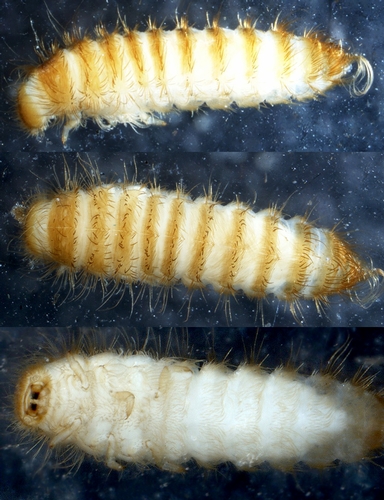BALTIMORE – U.S. Customs and Border Protection (CBP) agriculture specialists in Jacksonville, Florida and in Baltimore teamed up recently to mitigate a serious economic threat posed by a beetle. This wasn’t just any beetle; it was Trogoderma granarium Everts, commonly known as Khapra beetle, one of the world’s most destructive insect pests.

specialists found this Khapra beetle
on a vehicle carrier Feb. 4, 2019
(USDA photo)
While inspecting the M/V Green Ridge, a 650-foot vehicle carrier, February 4, Jacksonville CBP agriculture specialists discovered one live suspected Khapra beetle larvae and many caste skins in a dry goods store room. CBP collected the specimens, sealed the store room and permitted the vessel to transit to Baltimore while the U.S. Department of Agriculture entomologist identified the pest.
The USDA entomologist confirmed the larvae as Khapra beetle February 6. On the same day, Jacksonville CBP agriculture specialists issued an Emergency Action Notification requiring the vessel be fumigated. Baltimore CBP agriculture specialists boarded the vessel and notified the ship’s captain that cargo offloading was suspended until the fumigation could be completed. Fumigation completed on Saturday and cargo operations commenced Monday.
“The teamwork exhibited by Customs and Border Protection agriculture specialists in Jacksonville and Baltimore demonstrate CBP’s unwavering commitment to safeguarding America’s agricultural resources and our nation’s economy against a highly-invasive and destructive insect pest,” said Casey Durst, CBP’s Field Operations Director in Baltimore. “Agriculture protection is a paramount mission for CBP and a mission that we take very serious.”
The vessel arrived to Jacksonville from Panama, with previous port calls in Southwest Asia and North Africa, regions where Khapra beetle have established.
Khapra beetle is most destructive of stored grains, cereals and seeds, and it presents potentially crippling economic consequences to grain and cereal exporters such as the United States. Due to those consequences, Khapra beetle remains the only insect in which CBP takes regulatory action, even when the insect is in a dead state.
According to the USDA Animal and Plant Health Inspection Service (APHIS), previous U.S. infestations of Khapra beetle have resulted in massive, long-term control and eradication efforts at great cost to the American taxpayer.
In 1953, California implemented extensive eradication measures following a Khapra beetle infestation discovered there. The effort was deemed successful, but at a cost of approximately $11 million. Calculated in today’s dollars, that would be about $90 million.
CBP agriculture specialists have extensive training and experience in the biological sciences and agricultural inspection. Learn more about how CBP protects our nation’s agriculture.
On a typical day nationally, CBP agriculture specialists interdicts 4,638 prohibited meat, plant materials or animal products, and intercepts 352 agriculture pests and diseases. Learn more about what CBP achieves during a “Typical Day.”
CBP's border security mission is led at 328 international ports of entry by CBP officers and agriculture specialists from the Office of Field Operations. CBP uses a variety of techniques to intercept narcotics, unreported currency, weapons, prohibited agriculture, and other illicit products, and to assure that global tourism remains safe and strong. Please visit CBP Ports of Entry to learn more about how CBP’s Office of Field Operations secures our nation’s borders.
Learn more about CBP at CBP.gov.

